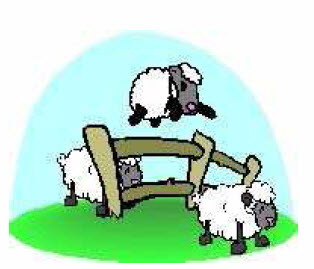A while ago I had trouble sleeping. I used to lie awake, staring at the ceiling, for hours and hours. Then one day my grandmother suggested I tried counting sheep after I‘d gone to bed. As always when my grandmother suggests things,
I decided to try it out. The only problem was, there were no sheep around to be counted when I went to bed.

Creative as I am, that wasn‘t going to stop me. I sat down and wrote a computer program that made a grid of characters, where # represents a sheep, while . is grass (or whatever you like, just not sheep). To make the counting a little more interesting, I also
decided I wanted to count flocks of sheep instead of single sheep. Two sheep are in the same flock if they share a common side (up, down, right or left). Also, if sheep A is in the same flock as sheep B, and sheep B is in the same flock as sheep C, then sheeps
A and C are in the same flock.
Now, I‘ve got a new problem. Though counting these sheep actually helps me fall asleep, I find that it is extremely boring. To solve this, I‘ve decided I need another computer program that does the counting for me. Then I‘ll be able to just start both these
programs before I go to bed, and I‘ll sleep tight until the morning without any disturbances. I need you to write this program for me.
The first line of input contains a single number T, the number of test cases to follow.
Each test case begins with a line containing two numbers, H and W, the height and width of the sheep grid. Then follows H lines, each containing W characters (either # or .), describing that part of the grid.
For each test case, output a line containing a single number, the amount of sheep flock son that grid according to the rules stated in the problem description.
Notes and Constraints
0 < T <= 100
0 < H,W <= 100
2
4 4
#.#.
.#.#
#.##
.#.#
3 5
###.#
..#..
#.###
